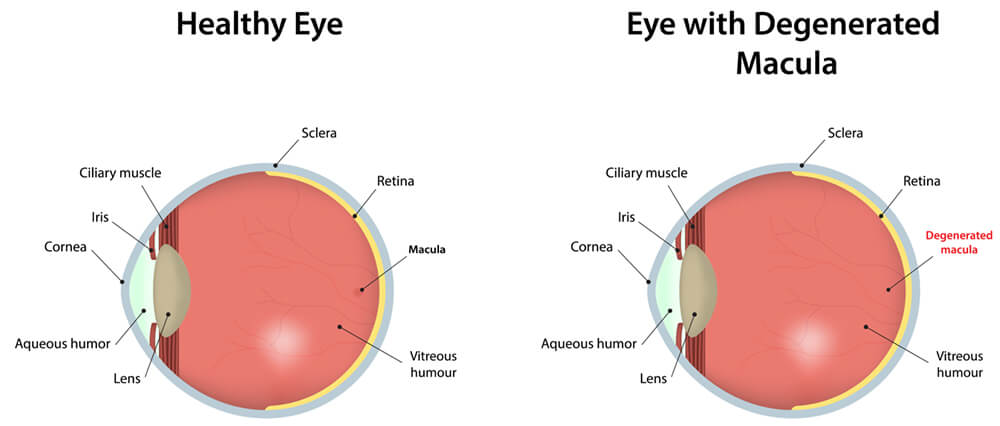
Are you or a loved one experiencing difficulties with central vision, making tasks like reading or recognizing faces more challenging? You’re not alone. Age-related macular degeneration (AMD) is a condition that many people encounter as they grow older, affecting the part of the eye responsible for sharp, central vision.
The good news is that understanding AMD and knowing your options can help you manage its impact and maintain a good quality of life. Let’s explore macular degeneration treatment and how we can help you slow its progression.
What is Age-Related Macular Degeneration (AMD)?
Age-related Macular Degeneration is a condition that many people encounter as they get older. It affects the macula, a small part of the retina responsible for your central vision. This can make everyday tasks like reading or recognising faces challenging. While your peripheral vision remains unaffected, the decline in central vision can significantly impact your quality of life.
There are two types of AMD: dry and wet. As an ophthalmologist near you, Dr Soma is here to help guide you and ensure that your vision remains as functional as possible.
What are the Types of Age-related Macular Degeneration?
Dry Macular Degeneration
Dry AMD is the more common form, where yellow deposits are called drusen from under the retina. Over time, these deposits can cause the macula to be thin and lose its ability to function correctly. Fortunately, dry AMD progresses slowly.
Wet Macular Degeneration
Wet AMD is less common but more severe. It happens when abnormal blood vessels grow under the retina and macula. These vessels can leak and bleed, causing rapid vision loss.
Wet AMD is known for forming neovascular membranes at the macula, making it more urgent to address. As a Midrand ophthalmologist, we are here to help you deal with your macular degeneration.
What Causes AMD?
Understanding what causes AMD can help you take preventive steps. Here are some key factors:
- Genetics: If AMD runs in your family, your risk is higher.
- Hypertension: High blood pressure can contribute to AMD.
- Stargardt Disease: This condition, usually affecting younger people, can predispose them to AMD.
- Diet: A diet lacking in antioxidants and high in unhealthy fats can increase your risk.
- Oxidative Stress: This type of damage is more common in Caucasians than in African patients.
- Lifestyle Factors: Smoking and too much exposure to UV light can also play a role.
What are the Symptoms of AMD?
Spotting the symptoms of age-related macular degeneration early can make a big difference.
Look out for:
- Distorted Vision: Straight lines might appear bent or missing.
- Central Shadows: You might notice dark, blurry areas in the centre of your vision.
- Distorted Central Vision: The object might look warped or smaller.
- Slow Vision recovery: After bright light exposure, it might take longer for your vision to adjust.
How is AMD Treated?
While there isn’t a cure for age-related macular degeneration, there are ways to manage it and slow its progression.
Dry AMD Treatment
Supplements with vitamins, minerals, and antioxidants can help with dry age-related macular degeneration. These might include vitamins C and E, zinc, and lutein, all known to support eye health.
Wet AMD Treatment
Wet age-related macular degeneration can be more actively managed with treatments like:
- Laser Therapy: This can help seal off and shrink abnormal blood vessels.
- Injections: Anti-VEGF (vascular endothelial growth factor) injections can reduce the growth of these vessels. For the best results, you might need multiple injections.
How Can You Prevent AMD?
You can take several steps to reduce your risks of developing age-related macular degeneration or slow its progression:
- Healthy Nutrition: Eating a diet rich in leafy greens, fish, and foods high in antioxidants can support your eye health.
- Regular Exercise: Staying active improves your overall health and reduces your risk of AMD.
- Avoid Smoking: Smoking significantly increases the risk of age-related macular degeneration.
- Protect Your Eyes from UV Light: Wearing sunglasses and hats can shield your eyes from harmful UV rays.
Get Started with Your Age-Related Macular Degeneration Treatment Today
Dealing with age-related macular degeneration can be challenging, but you are not alone. You can manage your condition effectively by understanding AMD and taking proactive steps. There is no cure yet, but with a healthy lifestyle and following Dr Soma’s advice, you can protect your vision and enjoy a better quality of life.
Your journey with AMD may have challenges, but you can face them confidently with the right approach. As an ophthalmologist near you, we are here to guide you through that approach in an informative and caring way.